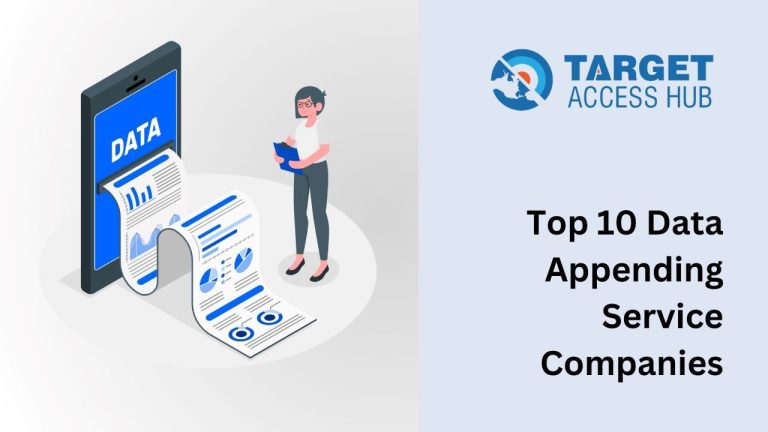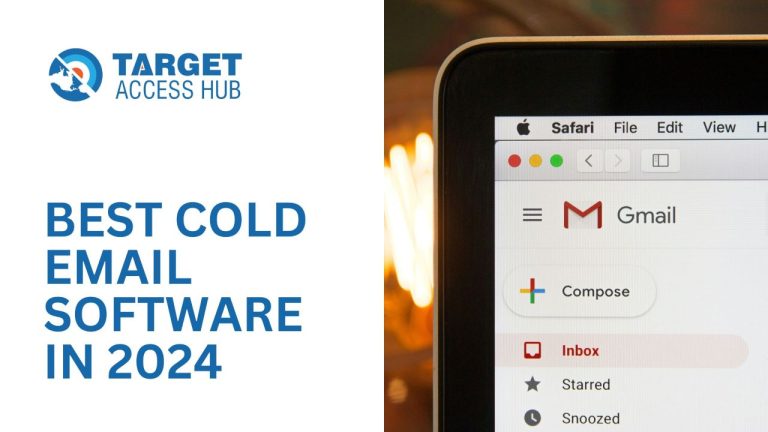How Email Scraping Tools Work: A Comprehensive Guide
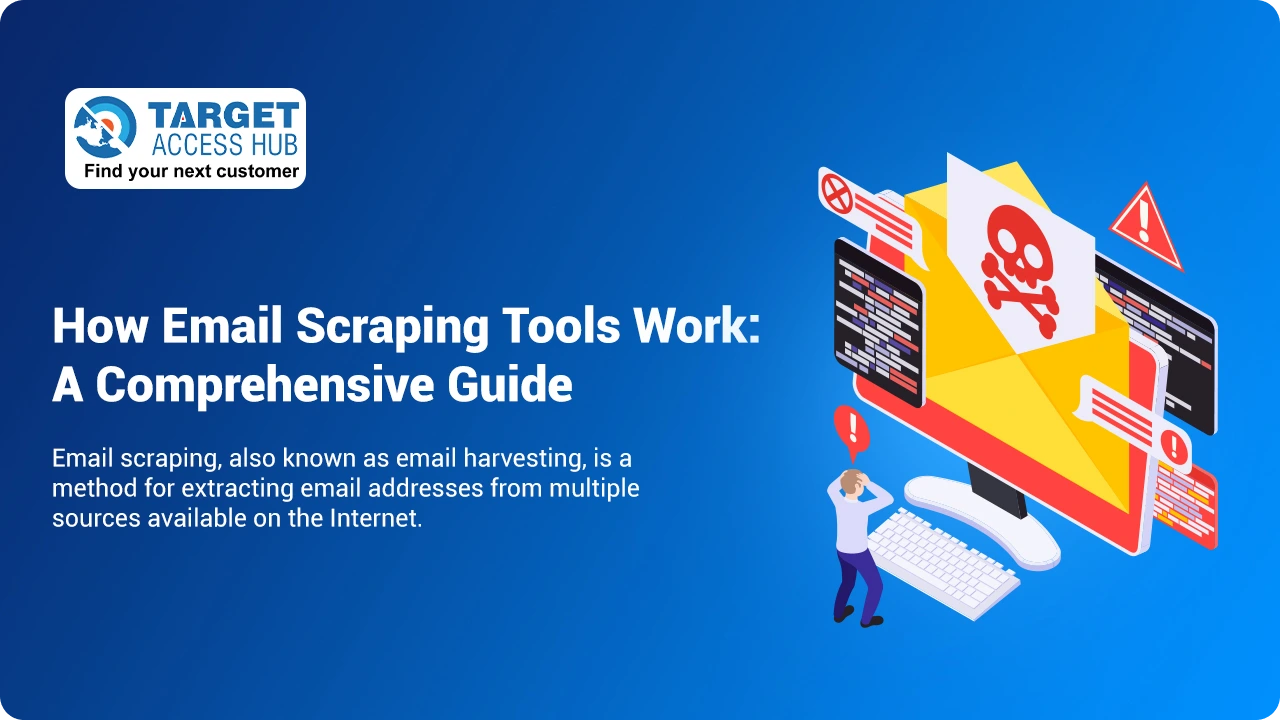
What Is Email Scraping?
Email scraping, also known as email harvesting, is a method for extracting email addresses from multiple sources available on the Internet. Hackers and spammers most commonly use this extensive database of email addresses to send spam messages or run phishing attacks on unsuspecting individuals.
Email scraping involves using automated software known as a scraper or harvester to find and collect email addresses from web pages, documents, and databases. These addresses are then compiled into a list that may be used for various purposes, including some illegal activities.
However, email scraping is also employed for legitimate purposes such as research, networking, and marketing. Let us delve deeper into email scraping and explore the best tools to combat spammers and hackers.
What Is Email Scraping Used For?
A collection of potential consumers’ email addresses is essential for marketing and commercial proposals. Since every trade offer must align with its target audience, the database must have specific qualities and be carefully curated. Thus, your web scraper must capture only relevant email addresses.
For B2B marketing organizations operating online, solid leads and accurate data are indispensable. Additionally, an email address database can benefit public organizations or companies that operate offline. A significant percentage of sales managers believe email scraping can help connect with potential clients.
Although only a few genuine clients may respond to an offer, email scraping provides the following benefits:
- Collect active, extensive, and valuable email addresses to create a detailed contact database
- Save the sales team time when finding clients.
- Automate the process of running email marketing campaigns.
- Track records to implement better strategies.
Is Email Scraping Legal?
The legality of email scraping depends on several factors, such as how the emails were collected, where you are located, and how the extracted emails will be used. Generally:
- Extracting or scraping emails from publicly available websites is typically allowed if no explicit restrictions exist.
- Using harvested emails for spam or sending unsolicited bulk emails without sufficient consent is illegal in most jurisdictions.
- Scraping emails from private databases or platforms without authorized access is considered hacking and is therefore unlawful.
- Some countries enforce data privacy regulations, such as GDPR and CCPA, which may prohibit the extraction and use of personal email addresses for business purposes without consent.
In some nations, governments enforce specific acts like GDPR and CCPA to prevent the unauthorized use of email addresses. Using personal email addresses without consent can lead to legal action.
What Is an Email Scraping Tool?
Email data is crucial for lead generation and market analysis. However, developing an email sales list from scratch, especially for small businesses, can be challenging due to limited resources.
Some businesses acquire pre-profiled lists from third parties, risking poor-quality email data that could harm their reputation. A better approach is to use email scrapers, which enable businesses to create highly targeted email lists at a reduced cost while increasing productivity.
What Does an Email Scraper Do?
To identify email scraping attempts, organizations must monitor their network for unusual behavior, such as a high volume of requests from the same IP address attempting to extract email addresses from webpages and social media platforms.
Organizations can also set up email filters to detect possible phishing messages or other malicious attempts associated with email scraping. To prevent email scraping, consider the following:
- Avoid making email addresses easily accessible on websites or other public sources.
- Use SSL/TLS protocols to protect and encrypt contact forms.
- Limit available contact data through social media platforms.
- Prevent web crawlers from obtaining email addresses.
Email scrapers help identify threats, enabling organizations to implement countermeasures to safeguard their databases.
How Email Scraping Tools Work?
An email scraper is a software program that automatically collects email addresses from web pages, online directories, and social media platforms. These tools operate by:
- Crawling publicly accessible web pages.
- Analyzing their content.
- Detecting text patterns that match email addresses.
When users input specific URLs or keywords, the program analyzes the websites and stores any discovered email addresses in a database or list.
Businesses often use email scrapers to generate contact lists. However, unauthorized scraping can violate privacy regulations, such as GDPR or CCPA.
Is Email Scraping Effective?

To understand better if email scraping is effective or not let use take a closer look with examples:
1. Email Address Collection
Email marketing is primarily used to increase revenues compared to other digital media platforms. Finding quality leads or selecting prospects that are a suitable fit for your organization might take a long time. Because the process takes so long, maintaining contact with potential clients becomes increasingly tricky.
Example Case: Google Maps is a significant source of lead generation in a particular industry, particularly for B2B enterprises that interact with local businesses. To reach out to these new clients, you may obtain contact information such as email addresses, social media profiles, and phone numbers. Web scraping enables businesses to get a list of all service providers’ contact details within a specific region.
2. Enhance Email Campaigns
An email campaign is the process of educating people about the goods and services offered by a business in order to generate traffic and revenue. You must first create an email list for your intended audience. Your website, social networking platforms, forms, and sign-up sites may all be used to acquire customer data such as names and email addresses.
Example Case: To run a successful email campaign, you need to have extensive contact database. With legal methods and email scrapings tools you can attain all the email addresses, phone numbers, and various contact information about potential clients. The most critical aspect is consistency. Inactive email addresses should be deleted on a regular basis.
3. Easily Monitor Data
Email marketing is one of the most common ways to establish or promote a business. Web scraping enables businesses to scan numerous channels and communicate with consumers who have referenced their brand on social media.
You can track all mentions of your business as a keyword or related hashtags on social media. You may extract useful information from your brand hashtags, location-specific hashtags, and audience-specific hashtags, such as comments, user profiles, post URLs, and IDs.
Example Case: Brandwatch used Twitter data to boost campaign impressions and reach out to potential consumers. Monitoring relevant hashtags and phrases on Twitter may provide insight into how businesses’ efforts are doing, including tracking and assuring campaign success.
Best Email Scraping Tools?
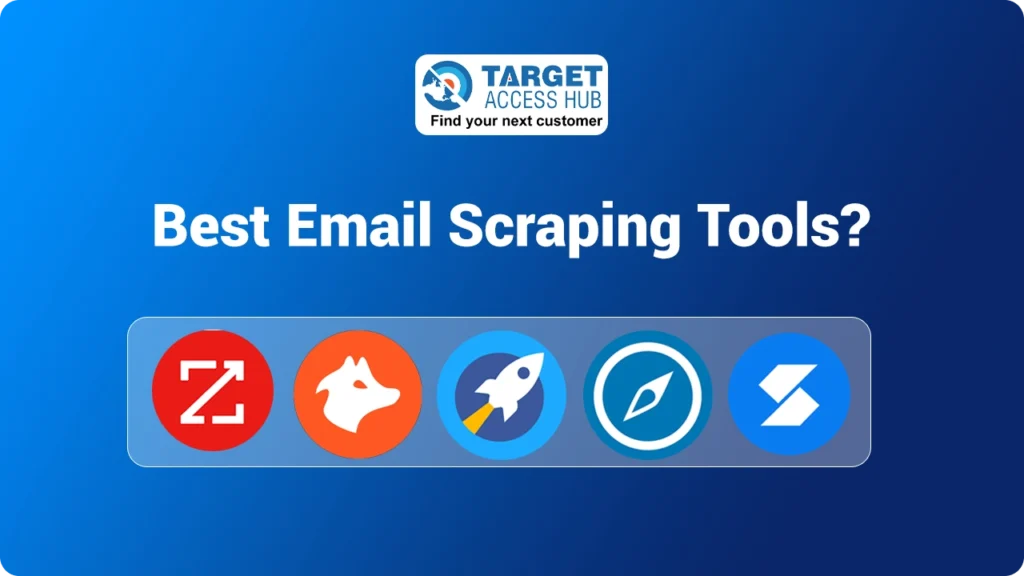
Here are the top five best email scraping tools:
1. ZoomInfo
A full-featured email scraping software with an extensive database. You may look for titles and corporations straight through their portal. It functions more like a directory system, providing contact information for professionals across various industries. Email lists are considered assets. However, it is not free. If you want to get precise sales leads, it’s worth the investment. ZoomInfo is an excellent choice for enterprise-level sales prospects.
2. Skrapp.io
LinkedIn offers a streamlined interface that includes a website search, domain lookup, and leads database. It can find the business email address of a LinkedIn profile. Other email scrapers will find the user-friendly interface quite enticing. It provides a monthly package that ranges from $49 to $299. The free plan allows you to acquire up to 150 lookups each month.
3. Hunter.io
An email scraping platform that includes a Chrome addon. You may look for a company’s email address using its domain name. Alternatively, search for a particular expert via email. It starts at $49 per month for 1000 lookups and goes up to $399 per month for 50,000. Its user-friendly interface makes it a fantastic alternative for a first-time self-starter.
4. LinkedIn Sales Navigator
A LinkedIn property tool. That being said, it provides high-quality prospect contact information. Furthermore, the lead recommendation tool reduces the need to find on your own. The Advanced Lead and Company Search removes extraneous contacts, making prospecting more accurate. It may also link with CRM software, boosting your sales performance. It streamlines and makes the prospecting, filtering, and outreach process more pleasant.
5. Rocket Reach
It’s an email marketing tool but a little more challenging to use. It features a Chrome addon that can easily pull up email addresses from a page. You may also get contact information using their search page. However, the cost of leads is higher than that of others. It is better suited to business users such as Facebook and Google.
Benefits of Email Scrapers for Businesses
The benefits of using email scraping tools for businesses all over the world are listed below:
- Automation and efficiency: Email scraping software automates the process of collecting emails, saving time and effort over manual techniques.
- Data aggregation: Email scrapers may combine data from several sources to help you generate a complete list of email addresses.
- Granularity based on criteria: You may target particular audiences by extracting emails based on parameters such as industry, region, or job title.
- Cost-effectiveness: Email scrapers can be less expensive than labor-intensive, time-consuming manual data-collecting techniques, which are particularly useful for small enterprises or startups with limited resources.
- Real-time data: Using an email scraper allows you to collect real-time information that will not be obsolete by the time a manual collecting procedure is completed.
How to Scrape Email Addresses from Any Website
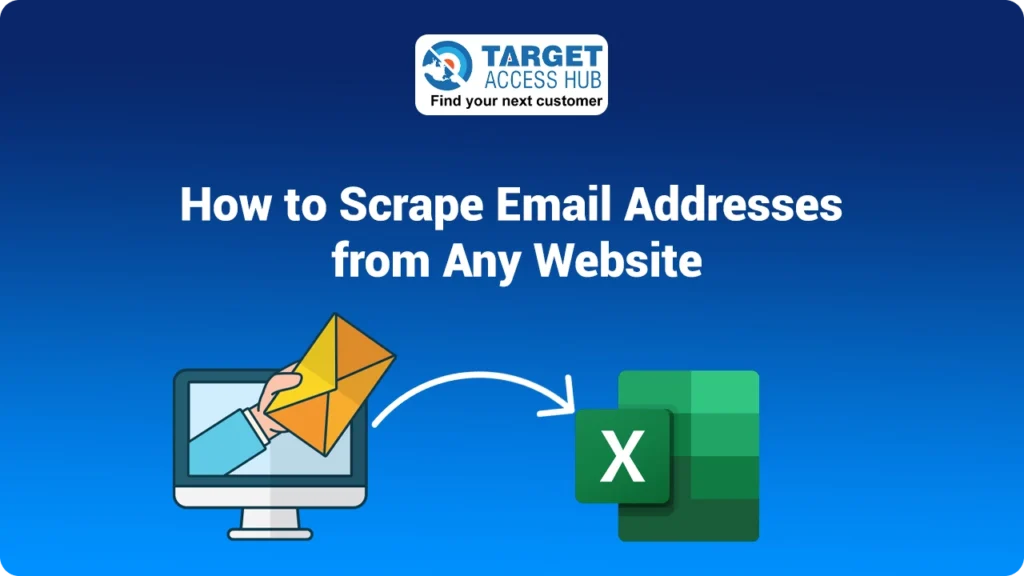
Here are the best ways you can scrape email addresses from any website:
- With an email scraper, you can also harvest emails from a vast number of corporate websites based on specific criteria, such as industry, geography, firm size, and so on.
- Many legitimate company profiles on various social media networks include contact information for the businesses. An email scraper can retrieve these emails in a fraction of the time that would be required if done manually.
- Although Facebook prohibits automatic access or site scraping without the company’s express written consent, there are acceptable ways to collect emails from a Facebook group that you control or govern. Without risking breaking Facebook’s terms of service, you may require that each individual who joins your group supply you with their email address.
Ethical Alternatives to Email Scraping
Email scraping can save time and money, expediting the email marketing process. However, violating rules and regulations can harm your organization. Consider these legal alternatives:
- Purchase Email Lists: Acquire verified and reputable email lists to ensure accuracy and quality.
- Landing Pages/Sign-Ups: Use organic methods by encouraging customers to provide their contact details on your website.
- Seminars: Collect contact details during physical or virtual seminars.
Adhering to governmental rules and regulations helps maintain your company’s reputation.
Conclusion
Email scraping is primarily used by scammers to carry out cyberattacks. Protect your organization by monitoring social media platforms, using email filters, analyzing your network, and removing official email addresses from public websites. Now, you have a comprehensive understanding of email scraping and how to safeguard yourself and your organization using the best tools.




![Partnership Emails: Best Practices & [With Email Templates]](https://targetaccesshub.com/wp-content/uploads/2024/01/Partnership-Emails-Best-Practices-With-Email-Templates-768x384.webp)
